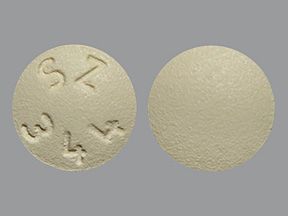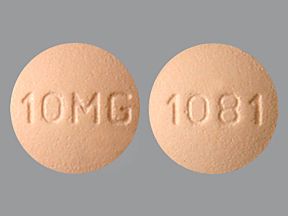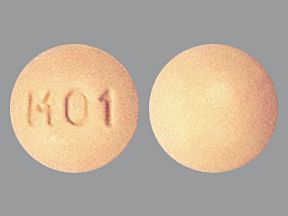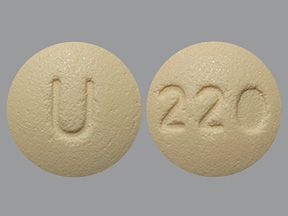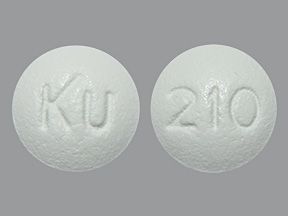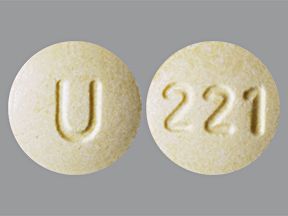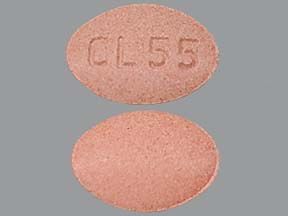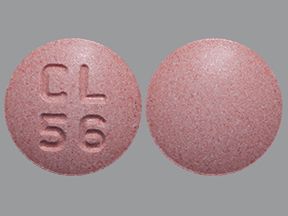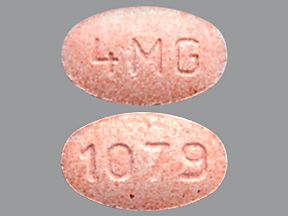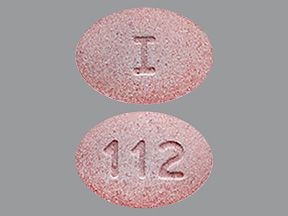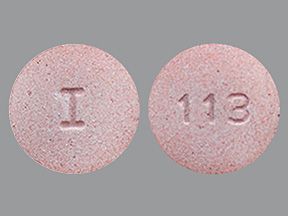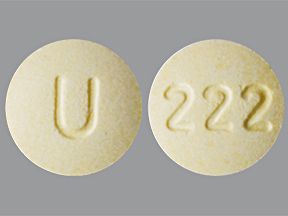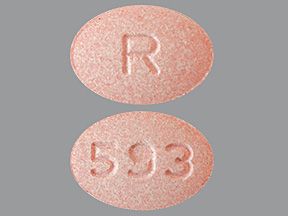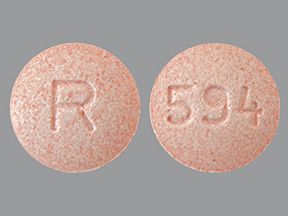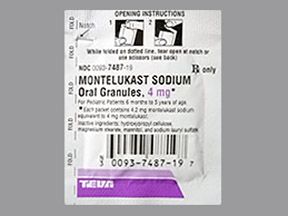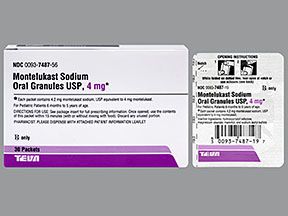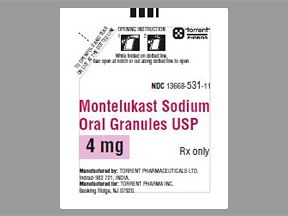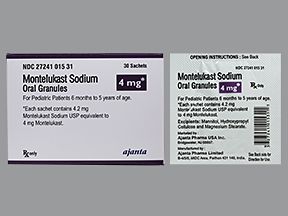Montelukast oral tablet is a generic prescription drug. It’s approved by the Food and Drug Administration (FDA) to:
- treat asthma
- help prevent short-term exercise-induced bronchoconstriction
- reduce symptoms of allergic rhinitis in people who can’t use other treatments or have tried other treatments that didn’t work well enough
See the “Montelukast uses” section below for details about how this drug is used.
Drug details
Montelukast belongs to a class of drugs called leukotriene receptor antagonists. Another term for this drug class is leukotriene modifiers. (A drug class is a group of medications that work in a similar way.)
Montelukast oral tablets should be swallowed. The tablets come in one strength of 10 milligrams (mg). They’re approved for use in adults as well as adolescents ages 15 years and older.
Your prescription label might refer to montelukast as “montelukast sodium.” These names refer to the same drug. Sodium is an inactive ingredient that allows montelukast to dissolve and be absorbed into your body. Montelukast oral tablets don’t contain a significant amount of sodium.
Note: Montelukast also comes in other forms that are taken orally (by mouth), specifically chewable tablets and oral granules. (Oral granules are a powder that can be swallowed, and can also be mixed into certain soft foods or liquids before swallowing.) Montelukast chewable tablets and oral granules come in strengths that are approved for use in younger adolescents and children. This article only addresses the 10-mg oral tablet form of montelukast. For information about montelukast’s other forms, talk with your doctor or pharmacist.
Brand-name versions
Montelukast oral tablet is the generic version of the brand-name drug Singulair.
Effectiveness
For information about the effectiveness of montelukast oral tablets, see the “Montelukast uses” section below.
Montelukast oral tablet is a generic drug. A generic drug is an exact copy of the active drug in a brand-name medication. Singulair is the brand-name medication that montelukast oral tablets are based on. A generic is considered to be as safe and effective as the original drug. Generics tend to cost less than brand-name drugs.
If you’re interested in using Singulair instead of montelukast oral tablets, talk with your doctor. They can tell you if Singulair can be used for your condition. If you have insurance, you’ll also need to check whether your plan will cover Singulair.
To learn more about how generics compare with brand-name drugs, see this article.
Montelukast oral tablets can cause mild and serious side effects. The following lists contain some of the key side effects that may occur while taking montelukast oral tablets. These lists do not include all possible side effects.
For more information about the possible side effects of montelukast oral tablets, talk with your doctor or pharmacist. They can give you tips on how to manage any side effects that may be concerning or bothersome.
Note: The Food and Drug Administration (FDA) tracks side effects of drugs it has approved. If you would like to notify the FDA about a side effect you’ve had with montelukast oral tablets, you can do so through MedWatch.
Mild side effects
Mild side effects* of montelukast oral tablets can include:
- upper respiratory infection
- fever
- headache
- sore throat
- cough
- abdominal (belly) pain
- diarrhea
- earache or ear infection
- runny nose
- sinusitis (pain or swelling in your sinuses)
- joint pain
Most of these side effects may go away within a few days or a couple of weeks. But if they become more severe or don’t go away, talk with your doctor or pharmacist.
* This is a partial list of mild side effects from montelukast oral tablets. To learn about other mild side effects, talk with your doctor or pharmacist, or view montelukast oral tablet’s prescribing information.
Serious side effects
Serious side effects from montelukast oral tablets aren’t common, but they can occur. Call your doctor right away if you have serious side effects. Call 911 or your local emergency number if your symptoms feel life threatening or if you think you’re having a medical emergency.
Serious side effects and their symptoms can include:
- Increased levels of eosinophils (a type of white blood cell), which can sometimes cause severe vasculitis (swelling throughout your blood vessels). This is also known as Churg-Strauss syndrome. Symptoms can include:
- Thrombocytopenia (low levels of platelets in your blood), which usually only causes symptoms in severe cases. Symptoms can include:
- Severe rash or swelling, such as Stevens-Johnson syndrome.
- Allergic reaction.*
- Serious behavior or mood changes, including suicidal thoughts or behaviors.†
- Sleep problems.*
- Liver issues.*
* For more information about this side effect, see “Side effect details” below.
† Montelukast oral tablets have a
Side effects in children
Montelukast oral tablets are approved for use in adults as well as adolescents ages 15 years and older. The side effects in adolescents are expected to be the same as the side effects in adults.
Note: Other forms of montelukast are approved for use in younger children. This article only addresses the oral tablet form of montelukast. For information on the side effects of montelukast’s other forms, talk with your doctor or pharmacist.
Side effect details
Here’s some detail on certain side effects this drug may cause.
Serious behavior or mood changes
Serious changes in behavior and/or mood have been reported in people taking montelukast oral tablets.
The drug has a
Some examples of these changes include:
- depression
- anxiety
- aggressive behavior
- confusion
- stuttering
- hallucinations (seeing or hearing things that aren’t really there)
- memory problems
- behaviors similar to those caused by obsessive-compulsive disorder (OCD)
- suicidal thoughts or behaviors
- tic (irregular, uncontrollable muscle movements) or tremors (uncontrolled shaking)
Serious behavior or mood changes didn’t occur in clinical studies of montelukast oral tablets. But they’ve been reported since the drug became available. These problems have occurred:
- during treatment with montelukast oral tablets and after people have stopped taking the drug
- in people with or without previously diagnosed mental health conditions
Because of these possible side effects, montelukast oral tablets should only be used when the benefits of treatment outweigh these risks. If you have allergic rhinitis, your doctor will likely only recommend this drug for you if you’ve already tried other treatments and they didn’t work for you.
If you (or those around you) notice mood or behavior changes while you’re taking montelukast oral tablets, call your doctor right away. Your doctor will likely have you stop taking montelukast. They may also suggest immediate treatment for this side effect, depending on your symptoms.
If you’re having suicidal thoughts or behaviors, call 911 or go to the nearest hospital or medical care facility. Healthcare professionals are always available and willing to help you get the care you need.
Suicide prevention
If you know someone at immediate risk of self-harm, suicide, or hurting another person:
- Ask the tough question: “Are you considering suicide?”
- Listen to the person without judgment.
- Call 911 or the local emergency number, or text TALK to 741741 to communicate with a trained crisis counselor.
- Stay with the person until professional help arrives.
- Try to remove any weapons, medications, or other potentially harmful objects.
If you or someone you know is having thoughts of suicide, a prevention hotline can help. The 988 Suicide and Crisis Lifeline is available 24 hours a day at 988. During a crisis, people who are hard of hearing can use their preferred relay service or dial 711 then 988.
Sleep problems
Sleep problems have occurred in people taking montelukast oral tablets. They weren’t reported during clinical studies of the drug, but problems with sleep have been reported since the drug was approved.
Sleep problems may include:
- insomnia (trouble falling asleep or staying asleep)
- unusual dreams
- sleepwalking
- talking while sleeping
If you develop sleep problems that concern you while you’re taking this drug, talk with your doctor. They may suggest ways to reduce this side effect. Or, they may have you stop montelukast and may suggest a different treatment option.
Liver issues
Mild and serious liver problems are possible side effects of montelukast oral tablets.
In clinical studies, mild liver issues included changes in liver enzyme levels on blood tests, such as elevated liver enzyme levels.
Serious liver issues didn’t occur during clinical studies of montelukast oral tablets. But there have been rare reports of serious liver problems in people taking the drug since it was approved. Examples include liver cell damage and cholestatic hepatitis. With cholestatic hepatitis, the flow of bile* becomes slowed or blocked. This can lead to inflammation (swelling and damage) of your liver.
Most people who reported serious liver issues had underlying conditions that increased their risk for liver disease. These conditions included excessive alcohol use or other forms of hepatitis (liver inflammation).
Symptoms of serious liver problems, including cholestatic hepatitis, may include:
- nausea
- fatigue (lack of energy)
- itchy skin
- dark urine
- jaundice (yellow tinge of the skin and/or the whites of the eyes)
If you develop these symptoms during montelukast treatment, talk with your doctor. They’ll have you stop taking the drug. Depending on how severe your liver problems are, they may recommend urgent treatment in a hospital, or they may monitor you using blood tests.
* Bile is a fluid produced by your liver that helps to digest fats in your food.
Allergic reactionAs with most drugs, some people can have an allergic reaction after taking montelukast oral tablets.
Symptoms of a mild allergic reaction can include:
- skin rash
- itchiness
- flushing
A more severe allergic reaction is rare but possible. Symptoms of a severe allergic reaction can include:
- swelling under your skin, typically in your eyelids, lips, hands, or feet
- swelling of your tongue, mouth, or throat
- trouble breathing
Call your doctor right away if you have an allergic reaction to montelukast oral tablets, as the reaction could become severe. Call 911 or your local emergency number if your symptoms feel life threatening or if you think you’re having a medical emergency.
The Food and Drug Administration (FDA) approves prescription drugs such as montelukast oral tablets to treat certain conditions. Montelukast oral tablets may also be used off-label for other conditions. Off-label drug use means using a drug for a purpose other than what it’s been approved for by the FDA.
Montelukast oral tablets are approved to:
- treat chronic (long-term) asthma
- help prevent acute (short-term) exercise-induced bronchoconstriction
- reduce symptoms of allergic rhinitis in people who can’t use other treatments or have tried other treatments that didn’t work well enough
The sections below describe these uses in more detail, as well as montelukast oral tablet’s effectiveness for each use.
Montelukast oral tablet for allergies
Montelukast oral tablets don’t relieve all allergy symptoms. They’re specifically used to reduce allergic rhinitis in adults as well as adolescents ages 15 years and older.* Allergic rhinitis is a term for common allergy symptoms, including:
- runny or stuffy nose
- itchy nose
- sneezing
Allergic rhinitis may also be called hay fever. It develops when your immune system overreacts to something in the environment. Montelukast oral tablets are used to treat two types of allergic rhinitis:
- Seasonal allergic rhinitis. With seasonal allergic rhinitis, allergy symptoms occur only during certain seasons, which are usually spring, summer, and early fall. This condition is usually caused by your immune system overreacting to pollen or mold spores in the air.
- Perennial allergic rhinitis. With perennial allergic rhinitis, allergy symptoms occur year-round, possibly every day. This condition is often caused by your immune system overreacting to pet hair or dust mites. (Perennial allergic rhinitis may also be called chronic rhinitis or year-round rhinitis.)
For more information about allergic rhinitis, see the Medical News Today asthma & allergies content hub.
* Montelukast also comes in other forms, including chewable tablets and oral granules. These other forms come in strengths that are approved for younger children with allergies. This article only addresses the 10-milligram oral tablet form. If you have questions regarding the uses of montelukast’s other forms, talk with your doctor or pharmacist.
Effectiveness for allergies
Clinical studies have shown that montelukast oral tablets are an effective treatment for reducing allergic rhinitis symptoms.
But
If you have questions about whether montelukast oral tablets are right for you, talk with your doctor.
Montelukast oral tablet for asthma
Montelukast oral tablets are used to treat or help prevent symptoms of chronic asthma in adults and adolescents ages 15 years and older.
Asthma causes inflammation (swelling and damage) and narrowing inside your airways. Symptoms can include:
- a feeling of tightness in your chest
- wheezing
- shortness of breath
- coughing
- increased mucus production
An asthma attack occurs when these symptoms suddenly become severe. It’s important to note that montelukast oral tablets don’t work to treat asthma attacks. Instead, the drug works to help prevent chronic (reoccurring) symptoms of asthma, and may help prevent asthma attacks.
If you have asthma, talk with your doctor about your asthma treatment plan. They’ll likely prescribe a rescue inhaler for you to use if you have an asthma attack. Montelukast oral tablets aren’t a rescue medication.
For more information about asthma, see the Medical News Today asthma & allergies content hub.
Effectiveness for asthma
Clinical studies have shown that montelukast oral tablets are an effective treatment for managing asthma.
It’s important to note that montelukast oral tablets shouldn’t be your only plan to manage asthma. You and your doctor will develop a personalized asthma care plan. This plan will include strategies to help prevent symptoms, such as avoiding certain triggers. It’ll also include tools to treat symptoms if they suddenly worsen (such as a rescue inhaler, which should be used to treat an asthma attack).
According to treatment guidelines from the Global Initiative for Asthma, montelukast oral tablets are recommended as a second-choice treatment option. This means that the drug should be used only if other treatments haven’t worked well enough to treat your asthma symptoms. First-line treatment options usually include low-dose inhaled corticosteroids, such as fluticasone (Flovent).
If you have questions about whether montelukast oral tablets are right for your asthma treatment, talk with your doctor.
Montelukast oral tablet for exercise-induced bronchoconstriction
Montelukast oral tablets are used to help prevent acute exercise-induced bronchoconstriction (EIB). For this purpose, montelukast oral tablets can be used in adults as well as adolescents ages 15 years and older.
Some people with asthma notice that their symptoms get worse when they exercise. Physical activity, especially in cold weather, commonly triggers asthma symptoms.
Heavy breathing during exercise naturally causes bronchoconstriction (narrowing of the airways to the lungs). This can lead to severe shortness of breath, wheezing, coughing, and chest tightness in people with asthma. Strenuous exercise, such as running or playing sports, can also lead to dehydration and dryness in your airways. This can also worsen EIB symptoms.
The Medical News Today asthma & allergies content hub also has more information about EIB.
Effectiveness for EIB
Clinical studies have shown that montelukast oral tablets are an effective treatment for helping to prevent EIB.
Montelukast oral tablets don’t work to stop a sudden EIB attack or asthma attack. The drug only works to help prevent EIB if it’s taken 2 hours before exercising.
It’s important to note that montelukast oral tablets shouldn’t be your only plan to manage EIB. If you have asthma with EIB, you and your doctor will develop a personalized asthma care plan. This plan will include strategies to help prevent symptoms, such as avoiding certain triggers. It’ll also include tools to treat symptoms if they suddenly worsen (such as a rescue inhaler, which should be used to treat an EIB attack).
Montelukast oral tablet and children
Montelukast oral tablets can be used in adolescents ages 15 years and older, as well as adults.
Montelukast also comes in other forms, specifically chewable tablets and oral granules.* These other forms come in lower strengths that are approved for use in younger children. This article only addresses the 10-milligram oral tablet form.
For information about montelukast’s other forms or its use in adolescents, talk with your doctor or pharmacist.
* Oral granules are a powder that can be swallowed, and can also be mixed into certain soft foods or liquids before swallowing.
The following information describes dosages that are commonly used or recommended. But be sure to take the dosage your doctor prescribes for you. Your doctor will determine the best dosage to fit your needs.
Drug strength
Montelukast oral tablets come in one strength: 10 milligrams (mg).
Note: Montelukast also comes in other forms: chewable tablets and oral granules.* These other forms of montelukast come in different strengths. This article only addresses the 10-mg oral tablet form. For information on montelukast’s other forms, talk with your doctor or pharmacist.
* Oral granules are a powder that can be swallowed, and can also be mixed into certain soft foods or liquids before swallowing.
Dosage for allergies
To treat allergic rhinitis (allergy symptoms such as a stuffy or runny nose and sneezing), you’ll take one 10-mg montelukast oral tablet once per day. This should be taken at about the same time each day. This is the dosage for adults as well as adolescents age 15 years and older.
This once-daily dosage for allergies applies for both seasonal allergic rhinitis and perennial allergic rhinitis.
With seasonal allergic rhinitis, allergy symptoms occur only during certain seasons (most commonly spring, summer, or early fall). And with perennial allergic rhinitis, allergy symptoms occur year-round, possibly every day.
For more information about these uses, see the “Montelukast uses” section above.
Dosage for asthma
To treat asthma, you’ll take one 10-mg montelukast oral tablet once per day, in the evening. This is the dosage for adults and adolescents ages 15 years and older.
Note: The manufacturer of montelukast oral tablets recommends taking the drug in the evening to treat asthma. But the manufacturer also states that clinical trials haven’t compared the effectiveness of evening vs. morning dosing. Make sure to take your dose at the time of day recommended by your doctor.
For more information about asthma, see the “Montelukast uses” section above.
Dosage for exercise-induced bronchoconstriction
To help prevent exercise-induced bronchoconstriction (EIB), you’ll take one 10-mg montelukast oral tablet at least 2 hours before exercising. This is the dosage for adults as well as adolescents ages 15 years and older.
It’s important to note that you shouldn’t take more than one dose in a 24-hour period. And if you already take montelukast oral tablet once daily for asthma or allergies, you should not take an extra dose before exercising.
For more information about EIB, see the “Montelukast uses” section above.
What is the dosage of montelukast oral tablet if I have both asthma and allergies?
It’s common for people with asthma to also have allergic rhinitis due to seasonal or perennial allergies. Your doctor may prescribe montelukast oral tablets to treat both conditions. If you’re an adult or an adolescent ages 15 years or older, you’ll take one 10-mg tablet once per day, in the evening.
Children’s dosage
The usual dosage for adolescents ages 15 years and older is the same as it is for adults: one 10-mg tablet once per day.
Note: Montelukast also comes in other forms, including chewable tablets and oral granules.* These other forms come in lower strengths that are approved for use in younger children. This article only addresses the 10-mg oral tablet form. For dosage information regarding montelukast’s other forms, talk with your doctor or pharmacist.
* Oral granules are a powder that can be swallowed, and can also be mixed into certain soft foods or liquids before swallowing.
What if I miss a dose?
If you miss a dose of montelukast oral tablets, you should skip the missed dose. Just take your next dose at your regular time. You shouldn’t take more than one dose every 24 hours. You don’t need to take an extra dose to make up for the missed dose.
To help make sure that you don’t miss a dose, try using a medication reminder. This can include setting an alarm or downloading a reminder app. A kitchen timer can work, too.
Will I need to use this drug long term?
Montelukast oral tablets are meant to be used as a long-term treatment. If you and your doctor determine that montelukast oral tablets are safe and effective for you, you’ll likely take the drug long term.
Different interactions can cause different effects. For instance, some interactions can interfere with how well a drug works. Other interactions can increase side effects or make them more severe.
Montelukast oral tablet and other medications
Montelukast oral tablets aren’t known to interact with other medications, herbs, supplements, or foods.
Before using montelukast, talk with your doctor and pharmacist. Tell them about all prescription, over-the-counter, and other drugs you take. Also tell them about any vitamins, herbs, and supplements you use. Sharing this information can help you avoid potential interactions.
If you have questions about drug interactions that may affect you, ask your doctor or pharmacist.
Montelukast oral tablets are usually prescribed as part of an asthma or allergy care plan. This plan will include:
- Treatment strategies for mild, moderate, and severe symptoms. These strategies may include rescue medications. A rescue medication is taken on an as-needed basis, only when symptoms become severe. Montelukast oral tablet is not a rescue treatment for asthma attacks, exercise-induced bronchoconstriction (EIB) attacks, or severe allergic reactions.
- Prevention strategies. These may include maintenance medications such as montelukast oral tablets. A maintenance medication is taken on an ongoing basis to help prevent or manage symptoms of your condition.
Maintenance medications
In addition to montelukast oral tablets, other maintenance or preventive medications for allergic rhinitis may include:
- Antihistamines. Some examples include:
- Nasal decongestants. Some examples include:
- Nasal corticosteroids. Some examples include:
- Nasal sprays. Some examples include:
- Immunotherapy, commonly called allergy shots.
In addition to montelukast oral tablets, other maintenance medications for asthma and/or EIB may include:
- Inhaled corticosteroids, such as:
- Inhaled corticosteroids combined with long-acting bronchodilators (drugs that relax your airways). Examples include:
- Xanthine drugs. Examples include:
- Anticholinergic drugs. Examples include:
- Biologic drugs (drugs made from parts of living organisms). Some examples include:
Rescue medications
If your asthma or EIB symptoms become severe, you’ll use a rescue inhaler. This is usually a quick-acting bronchodilator (a drug that rapidly relaxes your airways). Examples include:
- albuterol inhaler (Proair HFA, Proventil HFA, Ventolin HFA)
- levalbuterol inhaler (Xopenex HFA)
Montelukast oral tablets are not a rescue treatment. The drug won’t work to treat a sudden asthma attack or EIB attack, or a severe allergic reaction. In these situations, follow your doctor’s emergency care plan instructions. If your symptoms aren’t relieved with your rescue treatment, call 911 or go to your nearest emergency room.
If you have questions about using other drugs with montelukast oral tablets, talk with your doctor or pharmacist.
Here are answers to some frequently asked questions about montelukast oral tablets.
What is montelukast’s classification? Is it a steroid or antihistamine?
Montelukast is classified as a leukotriene receptor antagonist. It’s not a steroid or an antihistamine. But it’s often prescribed in combination with a steroid or antihistamine to treat asthma and allergic rhinitis.
If you have other questions about montelukast oral tablet’s classification or use with these types of drugs, talk with your doctor or pharmacist.
Does montelukast cause weight gain or increased blood pressure?
It shouldn’t. In clinical studies, montelukast oral tablets weren’t reported to cause weight gain or increased blood pressure.
Steroid treatments for asthma, such as prednisone, may cause weight gain or increased blood pressure. But montelukast isn’t a steroid.
Your prescription label for montelukast oral tablets might refer to montelukast as “montelukast sodium.” These names refer to the same drug. Sodium is an inactive ingredient that helps the drug dissolve and be absorbed into your body. Montelukast oral tablets don’t contain a significant amount of sodium.
If you have high blood pressure or edema (excess fluid in your body), your doctor may have told you to limit your sodium intake. But taking montelukast oral tablets won’t affect these conditions. It shouldn’t increase your blood sodium levels, weight, or blood pressure.
Talk with your doctor or pharmacist if you have concerns about weight gain or increased blood pressure with montelukast oral tablets.
Does montelukast treat COPD? If it does, what’s the dosage for COPD?
Montelukast oral tablets aren’t approved to treat chronic obstructive pulmonary disease (COPD). So there isn’t an approved dosage of the drug that’s known to be effective for COPD.
If you have questions about COPD treatments, talk with your doctor. You can also find more information from the Medical News Today COPD content hub.
What should I know about stopping montelukast? Can I safely stop taking it?
Montelukast oral tablets don’t usually cause any harmful effects when you stop taking them.
At the end of a 12-week clinical study, people who stopped montelukast oral tablets for asthma didn’t report any rebound (suddenly worsening) asthma. So if you’re taking montelukast oral tablets to treat asthma, stopping this drug shouldn’t make your asthma symptoms suddenly get worse.
Rarely, there have been reports of serious mood and behavior problems in people who took montelukast. These were mostly reported during montelukast treatment, but some were reported after the drug was stopped. If you or those around you notice any changes in your mood or behavior after you stop taking montelukast, call your doctor right away. (For more information about this, see “Serious behavior or mood changes” in the “Montelukast side effects” section above.)
It’s important to talk with your doctor before stopping montelukast oral tablets. They may suggest other treatments for your condition.
What does montelukast oral tablet look like?
Montelukast oral tablets are small tablets that are either round or square-shaped. The color and markings on the tablet can vary depending on the manufacturer of the drug.
If you need help identifying your medications, talk with your pharmacist.
Is montelukast used for hives?
Montelukast isn’t approved to treat hives. (Hives, also called urticaria, are raised, itchy skin welts. They may appear lighter, darker, or redder than your usual skin tone.)
Montelukast oral tablets are sometimes prescribed off-label for hives. Off-label drug use is when a drug is prescribed for a purpose other than what it’s approved for.
Some studies have tested montelukast’s effectiveness for chronic (long-term) hives. In 2014, researchers
If you have questions about montelukast for hives, talk with your doctor.
There are no known interactions between montelukast oral tablets and alcohol.
But drinking a lot of alcohol while taking montelukast oral tablets may increase your risk for liver issues. Also, some research suggests that sulfites and histamines (which are present in certain alcoholic beverages) could potentially contribute to an asthma attack.
Serious liver problems, such as cholestatic hepatitis,* have been reported in people who took montelukast oral tablets. Most of these people also had an increased risk of liver issues due to excessive alcohol use or underlying forms of hepatitis (liver inflammation†). See “Liver issues” in the “Montelukast side effects” section above for details.
If you drink alcohol, talk with your doctor about how much alcohol is safe for you to have while taking montelukast oral tablets.
* With cholestatic hepatitis, the flow of bile becomes slowed or blocked. (Bile is a fluid produced by your liver that helps to digest fats in your food.) This can lead to hepatitis.
† Inflammation refers to swelling and damage.
You should take montelukast oral tablets according to the instructions your doctor or healthcare professional gives you.
You’ll likely take montelukast oral tablets once per day. You can take your dose with or without food.
When to take
When you should take montelukast oral tablets depends on your condition, and your doctor’s recommendation. The following table summarizes when to take montelukast according to the manufacturer’s instructions:
| Condition | When to take montelukast oral tablets |
| asthma | in the evening |
| exercise-induced bronchoconstriction (EIB) | 2 hours before exercising |
| allergic rhinitis | once a day, around the same time each day |
For asthma (and if you have both asthma and allergic rhinitis) the manufacturer of montelukast oral tablets recommends taking the drug in the evening. This is because when the drug was first studied, it was administered in the evening in clinical studies. There haven’t been other studies done to compare montelukast oral tablet’s effectiveness for asthma if the drug is taken in the morning. So it’s important to follow your doctor’s instructions for when to take montelukast oral tablets for asthma.
If you have EIB, you should only take one tablet in a 24-hour period. This is because montelukast’s effects for EIB last for about 24 hours. Even if you exercise more than once a day, you don’t need to take montelukast again.
If you’re taking montelukast for allergic rhinitis, you can take it any time of day, around the same time each day. This helps keep a consistent amount of the drug in your body. It also helps you get into a routine so that you’re less likely to miss doses.
To help make sure that you don’t miss a dose, try using a medication reminder. This can include setting an alarm or timer on your phone or downloading a reminder app. A kitchen timer can work, too.
If you still have questions about how to take montelukast oral tablet, talk with your doctor or pharmacist.
Taking montelukast oral tablet with food
You can take montelukast oral tablets with or without food.
Can montelukast oral tablet be crushed, split, or chewed?
No. Montelukast oral tablets are meant to be swallowed whole.
If you have trouble swallowing tablets, talk with your doctor. They may recommend a different form of montelukast for you, such as chewable tablets or oral granules. Oral granules are a powder that can be swallowed and can also be mixed into certain soft foods or liquids before swallowing.
Other drugs are available that can treat your condition. Some may be a better fit for you than others. If you’re interested in finding an alternative to montelukast oral tablets, talk with your doctor. They can tell you about other medications that may work well for you.
Note: Some of the drugs listed here are used off-label to treat these specific conditions. Off-label drug use means using a drug for a purpose other than what it’s been approved for by the Food and Drug Administration (FDA).
Alternatives for allergies
Examples of other drugs that may be used to reduce allergy symptoms include:
- cetirizine (Zyrtec)
- desloratadine (Clarinex)
- diphenhydramine (Benadryl)
- levocetirizine (Xyzal)
- loratadine (Claritin)
- zafirlukast (Accolate)
- immunotherapy, commonly called allergy shots
Alternatives for asthma
Some examples of other drugs that may be used to manage asthma symptoms include:
- zafirlukast (Accolate)
- zileuton (Zyflo CR)
- inhaled corticosteroids, such as:
- quick-acting bronchodilators (drugs that rapidly relax your airways), such as:
- long-acting bronchodilators, such as:
- ipratropium (Atrovent HFA)
- tiotropium (Spiriva)
- theophylline
Alternatives for exercise-induced bronchoconstriction
Many of the above drugs that are used to treat asthma can also be used to help prevent exercise-induced bronchoconstriction (EIB). Some examples of drugs that may be used to treat or help prevent EIB include:
- quick-acting bronchodilators, such as an albuterol rescue inhaler (Proair HFA, Proventil HFA, Ventolin HFA)
- inhalers that combine corticosteroids with long-acting beta agonists, such as:
Note: Many of the drugs in the lists above can be used as alternatives to montelukast oral tablets. Many of them can also be used with montelukast oral tablets. For more details, see the “Montelukast use with other drugs” section above.
Montelukast belongs to a class of drugs called leukotriene receptor antagonists. Another term for this drug class is leukotriene modifiers. A drug class is a group of medications that have a similar mechanism of action. Mechanism of action refers to how a drug works in your body.
Leukotrienes are a substance released by your immune system in response to certain triggers. Leukotrienes contribute to inflammation (swelling) in the body, which can cause symptoms in people with asthma or allergies. Some examples of common symptoms include increased mucus production and trouble breathing.
Leukotriene receptor antagonists help to reduce inflammation in your airways, including in your lungs and nasal passages. Montelukast works to keep your airways open. It also helps reduce your immune system’s overreactions to certain triggers. With asthma, these triggers may include cold weather or exercise. With allergic rhinitis (stuffy or runny nose and sneezing caused by allergies), common triggers are things such as pollen, mold, or pet hair.
How long does it take to work?
Montelukast oral tablets start working within 2 hours from the time you take your dose. It may take a few days of treatment before you notice a reduction in your asthma or allergy symptoms.
Montelukast oral tablets aren’t known to cause withdrawal. (Withdrawal refers to uncomfortable or harmful effects after you stop taking a drug. How long withdrawal lasts can vary.)
There haven’t been studies on whether montelukast oral tablets can cause drug dependence. (With dependence, your body needs the drug in order to feel normal.)
At the end of a 12-week clinical study, people who stopped taking montelukast oral tablets for asthma didn’t report any rebound worsening of asthma. This means that stopping montelukast oral tablets shouldn’t make your asthma symptoms get suddenly worse.
Rarely, there have been reports of serious mood or behavior problems in people who took montelukast. These were mostly reported during montelukast treatment, but some were reported after the drug was stopped. If you or those around you notice any changes in your mood or behavior after you stop taking montelukast oral tablets, call your doctor right away. (For more information about this, see “Serious behavior or mood changes” in the “Montelukast side effects” section above.)
You shouldn’t decide to stop montelukast oral tablets on your own. It’s important to talk with your doctor before making any changes to your treatment. They may suggest other treatments for your condition.
As with all medications, the cost of montelukast oral tablets can vary. The actual price you’ll pay depends on your insurance plan, your location, and the pharmacy you use.
Keep in mind that you may be able to get a 90-day supply of montelukast oral tablets. If approved by your insurance company, getting a 90-day supply of the drug could reduce your number of trips to the pharmacy and help lower the cost. If you’re interested in this option, check with your doctor or your insurance company.
Before approving coverage for montelukast oral tablets, your insurance company may require you to get prior authorization. This means that your doctor and insurance company will need to communicate about your prescription before the insurance company will cover the drug. The insurance company will review the prior authorization request and decide if the drug will be covered.
If you’re not sure if you’ll need to get prior authorization for montelukast oral tablet, contact your insurance company.
Financial and insurance assistance
Financial assistance to help you pay for montelukast oral tablets may be available.
Medicine Assistance Tool and NeedyMeds are two websites offering resources that may help decrease the price you pay for montelukast oral tablets. They also offer tools to help you find low-cost healthcare, as well as educational resources. To learn more, visit their sites.
Mail-order pharmacies
Montelukast oral tablets may be available through a mail-order pharmacy. Using this service may help lower the drug’s cost and allow you to get your medication without leaving home.
If recommended by your doctor, you may be able to receive a 90-day supply of montelukast oral tablets, so there’s less concern about running out of the medication. If you’re interested in this option, check with your doctor and your insurance company. Some Medicare plans may help cover the cost of mail-order medications.
If you don’t have insurance, you can ask your doctor or pharmacist about online pharmacy options.
Do not take more Montelukast oral tablets than your doctor recommends. For some drugs, doing so may lead to unwanted side effects or overdose.
What to do in case you take too much montelukast oral tablet
If you think you’ve taken too much of this drug, call your doctor. You can also call the American Association of Poison Control Centers at 800-222-1222 or use its online tool. But if your symptoms are severe, call 911 or your local emergency number, or go to the nearest emergency room right away.
This drug comes with several precautions.
FDA warning: Serious behavior or mood changes
This drug has a
Serious behavior or mood changes. Serious changes in behavior, mood, or both have occurred in people taking montelukast since the drug was approved. Some examples include depression, aggressive behavior, hallucinations, memory problems, and suicidal thoughts or behaviors.
Montelukast oral tablets should only be used when the benefits of treatment outweigh the risks of serious behavior or mood changes. If you notice changes in your behavior or mood while taking montelukast oral tablets, call your doctor right away.
See the “Montelukast side effects” section above for more details about this boxed warning.
Other precautions
Before taking Montelukast oral tablets, talk with your doctor about your health history. Montelukast oral tablets may not be right for you if you have certain medical conditions or other factors affecting your health. These include:
- Liver problems. There have been rare reports of serious liver problems in people taking montelukast. Examples include liver cell damage and cholestatic hepatitis. Most people who reported serious liver problems had certain risk factors for liver issues. These risk factors included excessive alcohol use or other forms of hepatitis (liver inflammation). If you’ve had liver disease or problems with alcohol, talk with your doctor before taking montelukast. They’ll help you compare the risks and benefits of montelukast oral tablet treatment.
- Sensitivity to aspirin or non-steroidal anti-inflammatory drugs (NSAIDs). Certain NSAIDs can trigger symptoms of asthma in some people. If you’re allergic to aspirin, or if anti-inflammatory drugs make your asthma worse, you should continue to avoid these medications while taking montelukast oral tablets. Some examples of drugs to avoid include aspirin, ibuprofen (Advil, Motrin), naproxen (Aleve), and celecoxib (Celebrex).
- Allergic reaction. The only contraindication for montelukast oral tablets use is a history of allergic reaction to the drug or any of its ingredients. (A contraindication is a reason why you should not take a drug, because of the risk of serious harm.) Ask your doctor what other treatment options would be better for you.
- Pregnancy. Montelukast isn’t known to increase the risk of congenital abnormalities (commonly known as birth defects). But your doctor can help you decide if the drug’s benefits for your condition outweigh its other risks. For more information, see the “Montelukast and pregnancy” section below.
- Breastfeeding. Montelukast isn’t known to cause harmful effects in a child who is breastfed. Your doctor can help you decide if the drug’s benefits for your condition outweigh its other risks. For more information, see the “Montelukast and breastfeeding” section below.
Note: For more information about the potential negative effects of montelukast oral tablets, see the “Montelukast side effects” section above.
Montelukast oral tablets aren’t known to be harmful during pregnancy. Clinical studies of the drug’s use during pregnancy haven’t shown an increased risk of congenital anomalies (commonly known as birth defects).
Montelukast treatment comes with other possible risks, such as serious behavior or mood changes.* Depending on your condition and its severity, your doctor will help you decide if a different treatment option might be better for you during pregnancy.
If you’re pregnant or planning to become pregnant, talk with your doctor. They can guide you on safely treating your condition during pregnancy.
* See “Serious behavior or mood changes” in the “Montelukast side effects” section above for details.
Montelukast oral tablets aren’t known to cause harmful effects during pregnancy. But montelukast treatment comes with other possible risks, such as serious behavior or mood changes.*
You may want to consider these risks if you’re sexually active and you or your partner can become pregnant. If so, talk with your doctor about your birth control needs while you’re taking montelukast oral tablets.
For more information about taking montelukast oral tablets during pregnancy, see the “Montelukast and pregnancy” section above.
* See “Serious behavior or mood changes” in the “Montelukast side effects” section above for details.
If taken while breastfeeding, montelukast is known to pass into breast milk. But the drug isn’t known to have any harmful effects on a child who is breastfed. But the nursing implications of montelukast oral tablets aren’t fully known.
If you’re breastfeeding or planning to breastfeed, talk with your doctor. They can guide you on safely treating your condition during this time, and healthy ways to feed your child.
When you get montelukast oral tablets from the pharmacy, the pharmacist will add an expiration date to the label on the bottle. This date is typically 1 year from the date they dispensed the medication.
The expiration date helps guarantee that the medication is effective during this time. The
Storage
How long a medication remains good to use can depend on many factors, including how and where you store the medication.
Montelukast oral tablets should be stored at a room temperature of 68°F to 77°F (20°C to 25°C) in a tightly sealed container away from light. Avoid storing this medication in areas where it could get damp or wet, such as bathrooms.
Disposal
If you no longer need to take montelukast oral tablets and have leftover medication, it’s important to dispose of it safely. This helps prevent others, including children and pets, from taking the drug by accident. It also helps keep the drug from harming the environment.
This article provides several useful tips on medication disposal. You can also ask your pharmacist for information about how to dispose of your medication.
Disclaimer: Medical News Today has made every effort to make certain that all information is factually correct, comprehensive, and up to date. However, this article should not be used as a substitute for the knowledge and expertise of a licensed healthcare professional. You should always consult your doctor or another healthcare professional before taking any medication. The drug information contained herein is subject to change and is not intended to cover all possible uses, directions, precautions, warnings, drug interactions, allergic reactions, or adverse effects. The absence of warnings or other information for a given drug does not indicate that the drug or drug combination is safe, effective, or appropriate for all patients or all specific uses.

